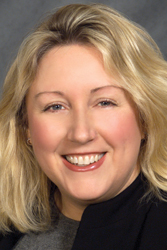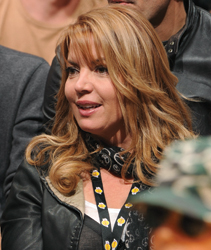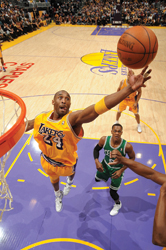One of the most startling sports deals of the year started with a simple phone call just after Thanksgiving.
It ended on Valentine’s Day, after a whirlwind romance that will result in the launch of two new regional sports networks in Los Angeles next year.
The speed and scope of the deal that saw the Lakers sell their local TV rights to Time Warner Cable for 20 years, starting with the 2012-13 season, stunned sports industry executives, most of whom had no clue the two sides even were talking.
Talks were initiated in November by Melinda Witmer, Time Warner Cable’s executive vice president and chief programming officer, who reached out to the Lakers to ask about their local TV rights.
| 
| Witmer |
At the time, the Lakers were in the middle of an exclusive negotiating window with FS West, which held rights to all Lakers home games through the 2011-12 season. So she started talking about the team’s away games, which had been carried by KCAL. The broadcast station’s exclusive negotiating window ended months before and no deal was imminent.
Witmer knew all about the Lakers’ TV rights. Wanting to dive deeper into sports rights, Witmer had hired a consultant to develop a chart that details exactly when all professional sports teams’ local TV deals expire. “It practically jumped off the page to us that the Lakers were up,” she said. “The Lakers are one of the most powerful brands in sports. We never had a pause.”
Witmer knew that her toughest job would be to convince the Lakers that Time Warner Cable was a viable option for them. The cable operator wasn’t really on the team’s radar to acquire local TV rights. Time Warner Cable operated only a local traffic channel and some on-demand channels in Los Angeles. In fact, it was probably best known for selling its local TV rights to the NBA’s Bobcats to Fox Sports Net in 2008.
While Time Warner Cable does not have the same kind of reputation as distributors like Comcast and DirecTV in the programming arena, Witmer argued that it should. It manages 34 local channels across the country — including New York 1 — and could easily launch a new regional sports network in Los Angeles, where it is the dominant cable operator. It already holds stakes in two RSNs: SportsNet NY and SportsTime Ohio.
“There’s been a realization the past couple of years that we’re good at local programming,” Witmer said. “We’ve flown under the radar, but I think we’re a powerhouse in local programming.”
The Lakers’ brass was intrigued and wanted to hear more.
The team’s window with Fox expired at the end of the year, and the two weren’t close. Sources say the Lakers were looking for at least a 15-year deal worth $3 billion, which averages out to $200 million a year. Fox didn’t look like it would go above $100 million a year, which was more than triple the $30 million annual rights fee it pays now.
The first week after the Lakers’ negotiating window with Fox expired, talks began to get serious with Time Warner Cable and encompassed both home and away games. The cable operator’s senior management team, including Time Warner Cable Chairman and CEO Glenn Britt, President and COO Rob Marcus and Witmer, flew from the Consumer Electronics Show in Las Vegas to Los Angeles to talk about the entire package.
| 
NBAE / GETTY IMAGES
The Lakers’ Jeanie Buss was part of the team of Lakers execs involved in the talks. |
During that round of meetings, the team hosted the cable operator executives at a Lakers game against the New Orleans Hornets at the Staples Center. Most of the Lakers front office attended, including executive vice president Jeanie Buss, senior vice president Tim Harris, team Chief Financial Officer Joe McCormack, Lakers general counsel James Perzik and Ed Desser, a longtime industry consultant hired by the Lakers to help negotiate a new deal.
“We had a great get-to-know-you meeting,” Harris said. “It wasn’t like, ‘Here’s a proposal.’ It was more like, ‘Here is who we are.’ We talked philosophy and we got to know each other as companies.”
There was an immediate connection, and both sides wanted to move forward. The Lakers were convinced that Time Warner was serious, and Witmer had persuaded them that Time Warner was able to create a high-quality RSN. “They walked in and said, ‘Here is what we know and anything else we will learn,’” Harris said. “We talked nuts and bolts, and we both wanted more Lakers.”
Witmer agreed. She left the meeting convinced that Time Warner Cable could pull off this deal.
“We all hit it off,” Witmer said. “There was a real feeling that we were like-minded on going forward.”
But there also was a real feeling that the two sides needed to act quickly. Time Warner Cable needed as much time as it could get if it was going to move forward and launch a new RSN in Los Angeles. If negotiations stretched too far into the spring, Witmer believed, Time Warner Cable would not have enough time for launch.
They agreed to meet the following week in New York during the NBA’s marketing meetings Jan. 10 and 11. Harris found himself serving as point man on the negotiations, since Buss increasingly was involved in CBA issues as a member of the NBA’s labor committee.
Harris and Desser spent 19 hours over Jan. 11 and 12 at Time Warner Center, where they began to map out the framework of the deal that began to take shape. That was when Witmer floated the idea of creating an additional Spanish-language RSN, to go alongside the English-language one they were discussing already.
“That was all Melinda, and it was an awesome idea,” Harris said. “That really was the clicking point.”
| 
NBAE / GETTY IMAGES
“The Lakers are one of the most powerful brands in sports,” says TWC’s Witmer. |
Witmer had been looking into launching a Spanish-language RSN for several years. This year, Time Warner Cable put about 20 Fox-produced Spanish-language Lakers games on an overflow channel in Los Angeles. Witmer’s group conducted research that showed a full-fledged Spanish RSN would be popular in its heavily Hispanic markets, such as Los Angeles.
“It’s something that’s been on our minds for a while,” Witmer said. “We’d be crazy to not recognize the importance of this to our consumers, given our footprint.”
Following the Jan. 10-12 meetings in New York, both sides were assured that the other was serious. The Lakers and Time Warner began hammering out specific details.
A key part of the talks was that Time Warner executives, whose only other NBA RSN deal is in small-market Charlotte, assured the Lakers of their ability to run an RSN with a valuable brand like the Lakers in a marquee market like Los Angeles. The Lakers were still looking to be assured that Time Warner Cable could produce a top-quality and contemporary network befitting the Lakers’ brand. Witmer dismissed concerns about the Bobcats situation, saying that it was only after letting go of the team’s rights that the cable operator began focusing on locally produced programming. “If that were to happen again, I don’t think we would have turned over the Bobcats’ rights,” Witmer said.
By the time the New York meetings ended, both sides knew they were on the path to cut a deal. Harris returned to Los Angeles and the deal progressed with a series of conference calls that moved talks forward. Less than three weeks later, Time Warner executives flew west to Los Angeles to close it.
The two sides started their final set of meetings Feb. 8 at the Lakers’ El Segundo offices. So comfortable were the negotiations that the Lakers insisted on casual dress. As talks dragged into the night, the Lakers stepped up the creature comforts. Buss’ office literally was turned into a spa, the furniture removed and massage therapists put on call. With the team on the road, the Lakers made the practice court available to Time Warner executives for breaks during negotiations. The Lakers gave each member of the Time Warner brass a backpack stuffed with O’Neill surf wear. The team brought a caterer on site.
“The whole point was to make everyone comfortable, and we felt comfortable with each other,” Harris said.
The final marathon session to come to a deal occurred over the next four days. The sides negotiated 12 hours a day — from 9 a.m. to 9 p.m. — in the Lakers’ El Segundo offices, with attorneys present to hammer out the finer points of the deal. Executives in the room said the presence of the attorneys helped speed up the process.
Lakers owner Jerry Buss, who was in Hawaii, was consulted and he fully supported the deal. Neither Lakers nor Time Warner Cable executives would say how much the deal was worth.
When the new Time Warner Cable channels launch next fall, they will become the third and fourth RSNs in the Los Angeles market. FS West will continue to operate with the MLB Angels and NHL Kings. Prime Ticket, also owned by Fox Sports Net, holds the rights to the MLB Dodgers, NBA Clippers and NHL Ducks.
The channels still are so new that they have no name, no launch date and no general manager. The have no distribution deals. But Witmer is determined to build up the channels in Los Angeles.
The likelihood of looking for sports rights in other markets where Time Warner Cable owns cable systems is strong.
“I’ve been a strong advocate of the value of local and regional programming at Time Warner Cable for a long time,” Witmer said. “Local programming is a way for us to connect with our customers.”






